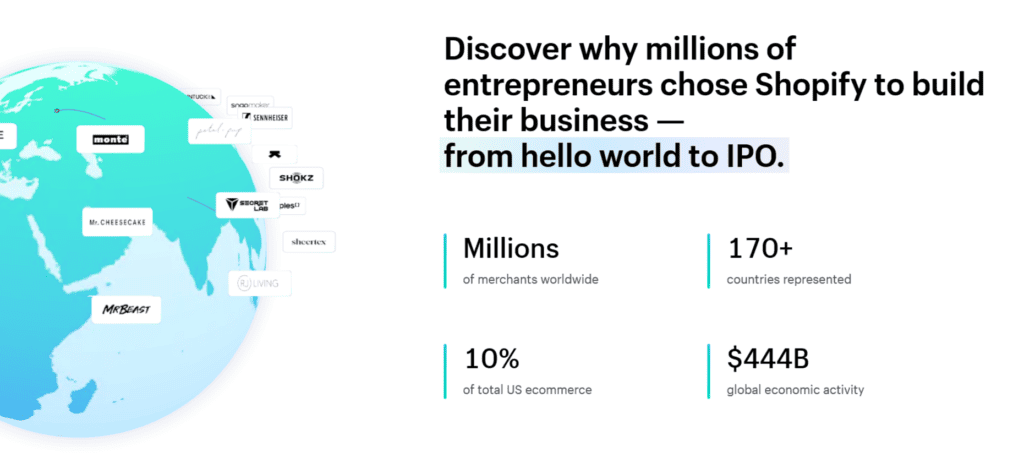In this article, we will dive into the core differences of the two widely-used Ecommerce solutions, Magento and Shopify.
I will analyze their characteristics, pricing structures, customization possibilities, and scalability. Our analysis will focus on examining their characteristics, evaluating the various pricing structures, exploring the customization possibilities, and assessing their scalability potential. Businesses may consider using this information to choose the best platform for their online stores.
The comprehensive comparison will show readers the strengths and weaknesses of the platforms. So they will be able to make an informed decision when starting an eCommerce store.
Shopify vs Magento: What’s the Difference?
The differentiating factor between Shopify and Magento lies in their conceptual approach. Shopify is for ease of use and simplicity. It targets individuals, either beginners or small to medium businesses, who may wish to launch quickly.
However, Magento is famous for its customization options. Bigger corporations with specific requirements opt for it.
Shopify vs Magento: Overview
Prior to delving into the analysis of features and performance, let’s delve into the fundamental nature of each platform.
What is Shopify?
Shopify is a hosted Ecommerce platform. It has all the features you need to set up an online store and sell your products.

Dating back to 2006, it is already top of the list as one of the most used platforms. It emphasizes its user-friendly interface and expansive in-app store that enhances its capabilities.
Pros and Cons of Shopify
It is crucial to understand the strengths and weaknesses of each platform to make an informed decision.
Pros of Shopify
Shopify shines in the bustling digital market, offering a range of features to boost your online business.
Explore the Shopify App Store for tools enhancing customer experience and business efficiency.
This platform adapts to online commerce needs. It has captivating Shopify themes and advanced features, as well as Shopify Plus capabilities.
Manage transactions with Shopify Payments and create a unique brand with free themes.
Dive into Shopify stores to turn your vision into an Ecommerce reality.
Cons of Shopify
These strengths have their drawbacks as well. Some individuals might feel limited by the available customization choices. The platform is subscription-based. This might lead to an expensive bill in the long run, especially when you start adding premium apps.
New store owners starting a business on Shopify may find the process of browsing through the ocean of themes and apps overwhelming. They may not take into account additional expenses, such as an unexpected guest.
Such cost can further erode your profit margins. This is especially true if you do not use Shopify Payments, which bypasses transaction fees and is the preferred partner.
What is Magento?
Magento is an open-source Ecommerce platform. It offers online merchants a versatile shopping cart system. It also offers robust customization options.

Adobe recently acquired Magento. Magento has a reputation for being scalable and suitable for businesses of all sizes.
Pros and Cons of Magento
Magento’s suite of offerings also comes with its own set of advantages and challenges.
Pros of Magento
Magento is renowned as the ultimate Ecommerce platform for its unparalleled flexibility and customization options. With numerous stalls and a vibrant community for development and support, it breaks free from the constraints of one-size-fits-all stores. SEO is also one of its key strengths, which makes it ideal for businesses that aim to grow their online presence.
Cons of Magento
Magento, as an open-source platform, requires a skilled developer to achieve optimal results. The platform is more complicated than Shopify. Hence, it is not suitable for individuals seeking a quick and effortless setup, irrespective of their technical knowledge.
Differences between Magento and Shopify: Why is choosing the right Ecommerce platform important?
Every Ecommerce platform offers distinctive strengths, customized to meet diverse business requirements. Let’s go deeper into the categories that matter the most when selecting an Ecommerce platform.
Cost and Pricing
Comparing the cost structures of Magento and Shopify is not as straightforward as listing their prices. Shopify offers tiered pricing plans.
The pricing of Magento is influenced by various factors, including hosting, development, and additional services that may be needed.
For small businesses on a budget, Shopify may be a more cost-effective solution initially. Its subscription model simplifies budgeting and lowers initial expenses. Magento’s open-source version is free to use, but it comes with more significant setup and maintenance expenses.
Design and Customization
Design and customization are where Magento and Shopify diverge significantly. Shopify provides a range of Shopify themes and drag-and-drop builder options that make it easy to create an attractive storefront. Its app store also contains numerous design apps to help tailor the look and feel of your site.
Magento is an open-source platform. This allows for extensive customization. It is ideal for companies with specific branding requirements. However, this means utilizing its full potential can be challenging for the average user without technical expertise.
Features and Functionality
Both platforms offer a robust set of features. These include inventory management, SEO tools, and marketing capabilities. However, Magento’s out-of-the-box offering is more exhaustive. It comprises features for customer segmentation, sophisticated pricing rules, and customizable product attributes.
Shopify, while not as extensive, focuses on user experience and simplicity. The app store can add functionality at the click of a button. Many applications are available to bridge any feature gaps.
User-Friendliness and Ease of Use
When it comes to user-friendliness, Shopify excels. Its dashboard is clear, and the setup process is straightforward, even for beginners. Magento, on the other hand, offers a steep learning curve, especially for those without technical expertise.

For those who value ease of use and quick setup over deep customization, Shopify is the clear winner. It provides a simple and intuitive experience for its users.
Scalability and Performance
Scalability is where Magento shines; it is designed to grow with your business. It handles large businesses and high-traffic volumes more effectively than Shopify. However, this scalability comes with a caveat. It may require a larger, more sophisticated hosting infrastructure, increasing costs.
Shopify is known for its reliability and quick loading times. This is especially true of its higher-tiered plans. While it’s less customizable, it has excellent out-of-the-box performance. This makes it a great pick for stores with moderate traffic.
Payment and Checkout Options
Both platforms provide a range of payment and checkout choices. However, Shopify’s payment gateway, Shopify Payments, simplifies the process for users. It offers a seamless integration. Magento is an open-source platform, so it allows for more flexibility in this area. However, this can lead to a more complex setup.
Customer Support and Resources
Shopify provides 24/7 customer support across all its Shopify plans, including live chat, phone, and email support. Magento marketplace usually requires a more hands-on approach to troubleshooting despite a strong community and support system.
However, Magento benefits from its extensive documentation and community forums. It is an excellent resource for Magento users who prefer to find solutions themselves or interact with a global community.
Security and Data Protection
Both platforms understand the need for robust security. Shopify, being a hosted platform solution, handles security patches and compliance on your behalf. It’s a PCI DSS-compliant platform, ensuring a secure environment for both you and your customers.

As Magento is an open-source platform, it demands proactive security measures. With control over your hosting environment, you can effectively implement security features to safeguard your online presence. However, you’re also responsible for keeping them up to date.
Upgrades and Maintenance
Shopify’s approach to upgrades and maintenance is hands-off for the user. The platform takes care of updates, relieving you of these technicalities. In contrast, Magento is an open-source platform. It may require more routine maintenance. A dedicated developer may handle upgrades and keep the platform running smoothly.
Shopify vs Magento: Plugins and Apps
The vibrant Shopify App Store burgeons with functional gems. They effortlessly integrate with different Shopify plans, enhancing storefronts with minimal effort.
Shopify’s plug-and-play convenience may incur additional costs, but it champions ease of use, whether it’s a sophisticated email marketing suite or an advanced payment processor.
On the other aspect of the retail horizon, Magento’s ocean is deep with extensions. These custom utilities are meticulously designed by a collective of developers to fulfill precise requirements. They include everything from gift cards to customer loyalty.
These two platforms have built-in features. They are designed to help ecommerce stores navigate online retail challenges.
The ideal choice depends on a merchant’s individual needs. It also depends on their vessel’s capacity to handle these tools.
Shopify vs. Magento: Which One is For You?
If you want an all-in-one eCommerce store solution, then choose Shopify; otherwise, consider Magento.
The choice of whether you are going to use Shopify or Magento marketplace depends on your business needs and objectives.
When to Choose Shopify:
- If you are a small or medium-sized firm and you need a quick and simple setup.
- If you prefer user-friendly interfaces that are easy to navigate, you may not like the latter as much. It diminishes the latter.
- Or, if you want a hands-off management of the maintenance and security.
When to Choose Magento:
- What if you’re a bigger business that’s either growing or has complicated needs?
- For the purpose of embracing qualities such as extreme customizability and flexibility.
- If you can manage the complex system with basic technical skills or resources available.
Magento vs Shopify – FAQs
Which one is better, Magento or Shopify?
Both platforms are strong in their own right. Yet, what constitutes “better” is contingent upon the distinctive needs of your business. Shopify is user-friendly and great for beginners. The Magento marketplace is highly customizable and scalable for complex businesses.
Does Magento work with Shopify?
Although Magento differs from Shopify, there are methods of connecting the two platforms. For example, you could use Shopify POS (Point of Sale). Then, Magento could handle your online backend.
Is Magento the best Ecommerce platform?
Magento store is considered one of the best Ecommerce platforms. This is because of its customizability and scalability. However, the ‘best’ platform depends on what you’re looking to achieve with your online business.
Does Nike use Magento?
Nike previously leveraged the Magento platform for its direct-to-consumer digital operations. As of 2020, Nike reportedly transitioned to the Adobe Commerce platform. Adobe’s enterprise-level Ecommerce store solution.
Why use Magento over Shopify?
Opt for Magento instead of Shopify for a highly customizable solution. Magento can grow with your business. Magento store is a better fit for businesses. It provides them with full autonomy to customize the design and features of their online store.
Is Shopify cheaper than Magento?
In the short run, Shopify may offer a more cost-effective option compared to Magento. This is because of Shopify’s simple pricing and easy setup. It’s especially helpful for smaller businesses. However, the long-term costs can balance out as your Shopify store grows. Subsequent high-tiered plans may be required.
Is Magento good for dropshipping?
Magento store can be used for dropshipping. It’s especially useful for managing a large dropshipping catalogue. It’s configurable down to the individual product level.
Why is Magento so expensive?
Magento is relatively more expensive than platforms like Shopify. Shopify is easier to install because it needs less development and customization. The Magento platform’s flexibility can bring a good return on investment. It’s an optimal business strategy and helps with continuity.
Is Magento good for beginners?
The Magento eCommerce platform is hard enough for beginners, so it is not suggested for them. It is an excellent choice for individuals with technical knowledge or a team member capable of handling the development work.
Is Magento free or paid?
There are two main versions of Magento:
Magento Open Source (formerly Community Edition) and Magento Commerce. Open Source software is free, yet you’ll need to manage hosting and site maintenance. Alternatively, Magento Commerce, a paid version, covers hosting and offers extra features.
Making the right choice between Magento and Shopify will shape the trajectory of your online business.
Whether you’re a burgeoning startup or an established retailer, grasping your requirements and selecting the platform that resonates with your vision is crucial for unleashing the complete potential of eCommerce success.
Shopify vs Magento: Conclusion
In summary, Shopify Vs Magento should be accepted based on the priorities while choosing web development and eCommerce efficiency.
All the platforms are robust content management systems. However, they are also designed to meet different needs and competency levels.
Shopify is a hub of convenience. It is an intuitive e-commerce platform. It has complete payment gateways and basic SSL certificates in the package. It’s the best fit for international companies wishing to expand.
Magento does not offer a wide range of customizations. It lets you adjust every aspect of your website, from SEO to detailed shipping and inventory systems. Drupal comes with strong out-of-the-box functionality. It aims to improve the site by adding and removing modules to meet your specific goals.



